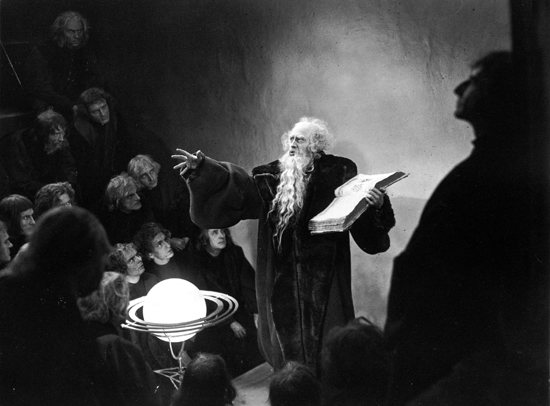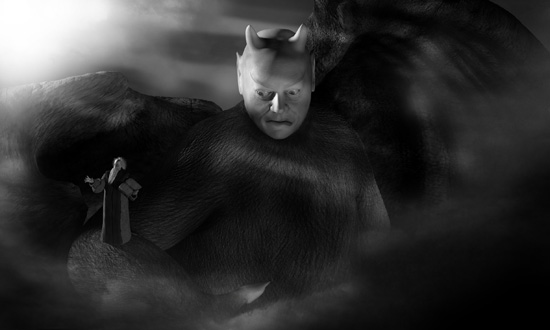wimpel69
02-07-2017, 08:19 PM
Please request the FLAC link in this thread. PMs will be ignored!
This is my own rip (BD-Audio to FLAC) - single audio file. Since most people seem to prefer it that way,
I did not go to the trouble again to edit it into separate tracks. Please do not share my material further,
also please add to my reputation! Limited sharing period!

Faust (1926) was the mammoth German production which won F. W. Murnau his contract with Hollywood's Fox Studios.
Emil Jannings glowers his way through the role of Mephistopholes, who offers the aging Faust (Gosta Eckman) an opportunity
to relive his youth, the price being Faust's soul. Though highly stylized, the film is unsettlingly realistic at times, especially
during the execution of the unfortunate Gretchen. Even in old age, actress Camilla Horn could recall how close she came to
genuine immolation when Murnau burned her at the stake. An American version of Faust had been planned earlier as a
Mary Pickford vehicle, but Pickford's mother wanted no part of a film in which her darling daughter strangled her own
baby. The scenario for Faust touches lightly upon the previous retellings by Goethe and Marlowe, but is more heavily
reliant on the paintings of Pietr Breughel.

While not as well known today as Nosferatu or The Last Laugh, Faust is perhaps director F.W. MURNAU's masterpiece;
few films by any director can match it for the sweeping impact and beauty of its visuals or the power of its storytelling.
Murnau approaches Goethe's tragedy of a man who learns all too well the price of his soul with appropriately broad
dramatic strokes, and if the effect seems a bit over the top in the early reels, it hits with full melodramatic force at the
end; the full, horrible impact of Faust's comeuppance is as disturbing today as it was in 1926. Gosta Ekman is fine as
the luckless Faust and Emil Jannings is brilliant as Mephisto, the embodiment of cunning and evil. And the camerawork
by Carl Hoffman and production design by Robert Herlith and Walter Rohrig are nothing short of astounding, creating a
brilliantly controlled and beautifully painterly visual sense that's the ideal backdrop for this fable. Anyone who thinks of
silent films as sluggish and amateurish has obviously never seen Faust; the home video release on Kino compliments
the film's striking visuals with a superb original score by the American composer Timothy Brock that's worthy of
attention on its own merits.
If you want to watch the film, accompanied by the score, you can do so on YouTube:
https://www.youtube.com/watch?v=cbtTMEtxty4

Music Composed and Conducted by
Timothy Brock
Played by the
Olympia Chamber Orchestra
"Timothy Brock is an active conductor and composer who specializes in concert works of the early 20th-century and live
performances of silent film. And as a leading authority on orchestral performance practices of the 1920's and '30's, he has
been engaged to conduct some of the most celebrated orchestras throughout the world, in both concert repertoire and
period film-music.
Considered one of the most foremost experts on silent-film music, his most notable contributions in this field are his
restorations and published editions of Dmitri Shostakovich's only silent film score, New Babylon (1929), Manilo Mazza's
Italian epic, Cabiria (1913), Erik Satie's dadaist score, Entr'acte (1924) and the famous George Antheil score to Ballet
m�canique (1924). Other film-score restorations include Max Butting's Opus I (1920), Camille Saint-Sa�ns' L'Assassinat
du duc de Guise (1908) and Ildebrando Pizzetti's Sinfonia del fuoco (1914).
His work on the Charles Chaplin scores began in 1998 when the Chaplin estate commissioned him to restore the illustrious
score to Modern Times, and has since then restored 12 Chaplin silent feature and short scores until the work's completion
in 2012. These scores include City Lights (1931), The Gold Rush (1924), and The Circus (1928). In 2004, Brock also
painstakingly transcribed some 13 hours of unheard Chaplin compositions from a newly discovered acetate recording
of Chaplin composing on the piano. This resulted in the creation of a new score for Chaplin's feature drama A Woman
of Paris (1923), a work that Brock has conducted in concert a number of times, including at Cinema Ritrovato 2005 in
Bologna, the Kino-Babylon in Berlin in 2011, as well as a recording made with Orchestra Citta Aperta in Rome and London,
with whom he has also conducted a complete recording of The Gold Rush in 2012.
Timothy Brock was also a pioneering figure in the area of what has become popularly-known as Entartete Musik, music
of composers banned by the Third Reich, for which he has received some of his widest acclaim. Between 1989-2000
he gave the North American premieres of Erwin Schulhoff's Symphony no. 2, Hanns Eisler's Kleine Sinfonie, Niemandslied
and Kuhle Wampe, as well one of the first-ever performances of Viktor Ullmann’s poignant opera, Der Kaiser von Atlantis,
written from within the Terezin ghetto in 1944. The works of Erwin Schulhoff (1894-1942), Franz Schreker (1878-1934),
Alexander von Zemlinsky (1871-1942), Hans Kr�sa (1899-1944), Gideon Klein (1919-1944) and Pavel Haas (1899-1944)
featured prominently in these series."
Source: Eureka BD, 2014, 2-channel stereo (48kHz) (My rip)
Format: FLAC (single file), DDD Stereo
File Size: 412 MB
Please request the FLAC link in this thread. PMs will be ignored!
This is my own rip (BD-Audio to FLAC) - single audio file. Since most people seem to prefer it that way,
I did not go to the trouble again to edit it into separate tracks. Please do not share my material further,
also please add to my reputation! Limited sharing period!
This is my own rip (BD-Audio to FLAC) - single audio file. Since most people seem to prefer it that way,
I did not go to the trouble again to edit it into separate tracks. Please do not share my material further,
also please add to my reputation! Limited sharing period!

Faust (1926) was the mammoth German production which won F. W. Murnau his contract with Hollywood's Fox Studios.
Emil Jannings glowers his way through the role of Mephistopholes, who offers the aging Faust (Gosta Eckman) an opportunity
to relive his youth, the price being Faust's soul. Though highly stylized, the film is unsettlingly realistic at times, especially
during the execution of the unfortunate Gretchen. Even in old age, actress Camilla Horn could recall how close she came to
genuine immolation when Murnau burned her at the stake. An American version of Faust had been planned earlier as a
Mary Pickford vehicle, but Pickford's mother wanted no part of a film in which her darling daughter strangled her own
baby. The scenario for Faust touches lightly upon the previous retellings by Goethe and Marlowe, but is more heavily
reliant on the paintings of Pietr Breughel.

While not as well known today as Nosferatu or The Last Laugh, Faust is perhaps director F.W. MURNAU's masterpiece;
few films by any director can match it for the sweeping impact and beauty of its visuals or the power of its storytelling.
Murnau approaches Goethe's tragedy of a man who learns all too well the price of his soul with appropriately broad
dramatic strokes, and if the effect seems a bit over the top in the early reels, it hits with full melodramatic force at the
end; the full, horrible impact of Faust's comeuppance is as disturbing today as it was in 1926. Gosta Ekman is fine as
the luckless Faust and Emil Jannings is brilliant as Mephisto, the embodiment of cunning and evil. And the camerawork
by Carl Hoffman and production design by Robert Herlith and Walter Rohrig are nothing short of astounding, creating a
brilliantly controlled and beautifully painterly visual sense that's the ideal backdrop for this fable. Anyone who thinks of
silent films as sluggish and amateurish has obviously never seen Faust; the home video release on Kino compliments
the film's striking visuals with a superb original score by the American composer Timothy Brock that's worthy of
attention on its own merits.
If you want to watch the film, accompanied by the score, you can do so on YouTube:
https://www.youtube.com/watch?v=cbtTMEtxty4

Music Composed and Conducted by
Timothy Brock
Played by the
Olympia Chamber Orchestra
"Timothy Brock is an active conductor and composer who specializes in concert works of the early 20th-century and live
performances of silent film. And as a leading authority on orchestral performance practices of the 1920's and '30's, he has
been engaged to conduct some of the most celebrated orchestras throughout the world, in both concert repertoire and
period film-music.
Considered one of the most foremost experts on silent-film music, his most notable contributions in this field are his
restorations and published editions of Dmitri Shostakovich's only silent film score, New Babylon (1929), Manilo Mazza's
Italian epic, Cabiria (1913), Erik Satie's dadaist score, Entr'acte (1924) and the famous George Antheil score to Ballet
m�canique (1924). Other film-score restorations include Max Butting's Opus I (1920), Camille Saint-Sa�ns' L'Assassinat
du duc de Guise (1908) and Ildebrando Pizzetti's Sinfonia del fuoco (1914).
His work on the Charles Chaplin scores began in 1998 when the Chaplin estate commissioned him to restore the illustrious
score to Modern Times, and has since then restored 12 Chaplin silent feature and short scores until the work's completion
in 2012. These scores include City Lights (1931), The Gold Rush (1924), and The Circus (1928). In 2004, Brock also
painstakingly transcribed some 13 hours of unheard Chaplin compositions from a newly discovered acetate recording
of Chaplin composing on the piano. This resulted in the creation of a new score for Chaplin's feature drama A Woman
of Paris (1923), a work that Brock has conducted in concert a number of times, including at Cinema Ritrovato 2005 in
Bologna, the Kino-Babylon in Berlin in 2011, as well as a recording made with Orchestra Citta Aperta in Rome and London,
with whom he has also conducted a complete recording of The Gold Rush in 2012.
Timothy Brock was also a pioneering figure in the area of what has become popularly-known as Entartete Musik, music
of composers banned by the Third Reich, for which he has received some of his widest acclaim. Between 1989-2000
he gave the North American premieres of Erwin Schulhoff's Symphony no. 2, Hanns Eisler's Kleine Sinfonie, Niemandslied
and Kuhle Wampe, as well one of the first-ever performances of Viktor Ullmann’s poignant opera, Der Kaiser von Atlantis,
written from within the Terezin ghetto in 1944. The works of Erwin Schulhoff (1894-1942), Franz Schreker (1878-1934),
Alexander von Zemlinsky (1871-1942), Hans Kr�sa (1899-1944), Gideon Klein (1919-1944) and Pavel Haas (1899-1944)
featured prominently in these series."
Source: Eureka BD, 2014, 2-channel stereo (48kHz) (My rip)
Format: FLAC (single file), DDD Stereo
File Size: 412 MB
Please request the FLAC link in this thread. PMs will be ignored!
This is my own rip (BD-Audio to FLAC) - single audio file. Since most people seem to prefer it that way,
I did not go to the trouble again to edit it into separate tracks. Please do not share my material further,
also please add to my reputation! Limited sharing period!
